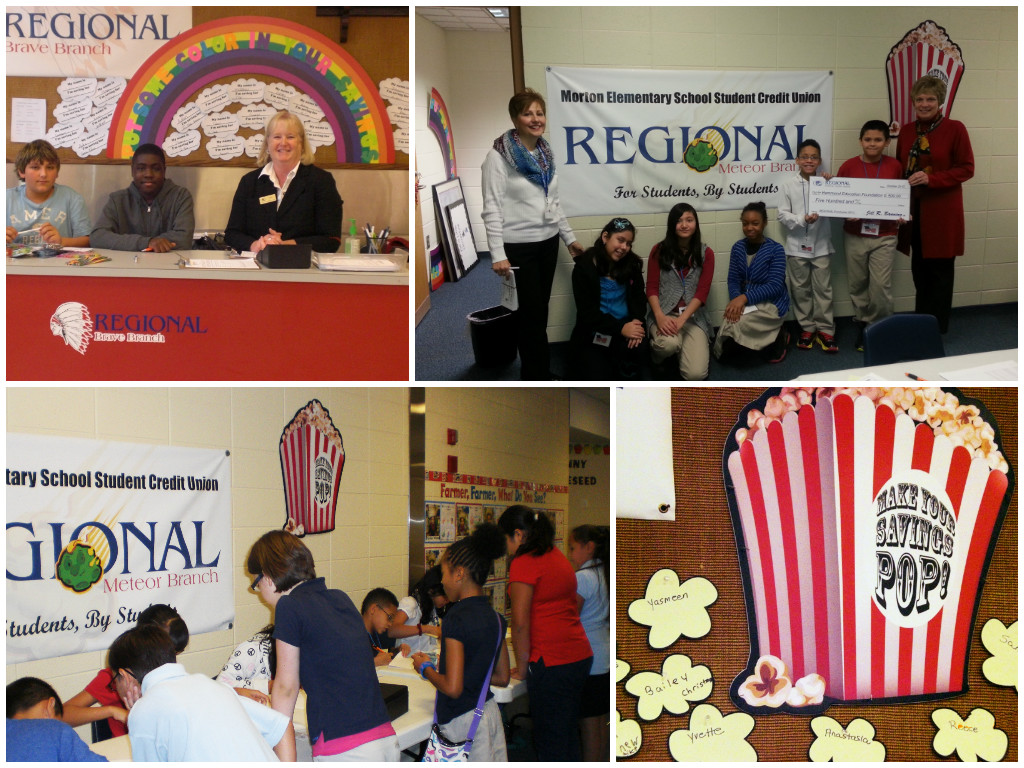It is never to early to start learning about money, saving, and budgets. Sure, it is not the most fun topic for a kid in their teenage years, but it is important for the future. That is why the Financial Literacy program at REGIONAL federal credit union engages with students throughout Lake and Porter County schools every month, informing them all about the importance of the almighty dollar.
Bobbie Escalante is the Director of School Initiatives for REGIONAL, which is part of the Student Credit Union program. The Student Credit Union helps students learn vital money-management skills while also providing each student the ability to withdraw and deposit any cash they have from their own established savings account during school hours.
The program is composed of six to 10 lessons depending on the grade level of the students. FCU specialists teach the lessons, also depending on the schools’ and teachers’ own financial classes.
“One particular topic we start with is financial psychology, so we give a pre-test to see what students know about financial literacy and at the end we give them a post-test to see what they learned,” Escalante said. “We talk to them about money and talk to them about ‘What’s your money-ality?’ and they take a short quiz and they determine what their ‘money-ality’ is based on their answers.”
The answers determine whether the teenager is a spender, a saver, or a giver. Are you a "Carpe-Diem" spender who spends all the money today and go broke tomorrow? Or are you a money guru, where you have a balanced approach to money?
“We give them the example of: We give you $10 this week and you won’t have another $10 for at least another week. What are you going to do with that $10?” she explained. “Do you run to the nearest coffee shop and spend it, or are you going to go to the grocery store and buy your own coffee so that you make it at home? Or are you going to find a friend to buy you coffee so that you can keep the $10?”
The program really stresses the importance of having goals and setting a course that is realistic and then pivots to focus on how to budget one’s money to accomplish those goals. REGIONAL works with 10 local schools, including Portage High School, Bishop Noll Institute, Morton High School, Hobart High School, and all schools in the Morgan Township School community. They go to a few middle and elementary schools as well.
REGIONAL establishes student credit unions in each school, setting up a temporary “bank” during the lunch hour. For $1 students can open a savings account and can make withdrawals and deposits just like they would at a credit union branch. The students are offered ATM and debit cards, and are taught about the differences between using the cards versus cash. There are no fees for any transactions, and most schools put a limit on the amount of money a student can withdraw, guaranteeing they have saved throughout the year.
Depending on the school level, the class topics vary, Escalante said. For high schoolers, since many 16 to 18-year-olds have jobs, the topics revolve about the future.
“We talk about what are they going to do after graduation. Is it college budgeting or are they are going into the workforce or military?” she said.
They then look at the cost to support the student’s personal style of living from rent and transportation, which then asks, does that mean taking the bus or if they are buying their first car, which then means car insurance. Then, they add in the food bill and any entertainment they want to pursue.
“The goal is to have money left over to save,” Escalante said. Depending on the level of the student’s grasp of money throughout the program, the specialists will teach about the use of credit cards, checks, balancing one’s check books, and investments. They also encourage students to start a six-month Head Start Youth CD, which they are not allowed to touch for those few months. The level of engagement with those of REGIONAL depends on what the school requests. The program can be used at any school establishment; they just would just have to contact the bank, Escalante said.
“We talk to the teachers and share with them what we have to offer and if they want us to come out,” she said. Some schools have even requested for them to talk to the students about future careers in the financial industry.
REGIONAL FCU offers different themes and topics for the literacy program and offers scholarships to students.
“We want to make sure students are doing whatever they can and as much as they can with the Student Credit Union because really, it is a place where they can do all their transactions until they are 18 without having to go to a bank,” she said. “We really are just here for all their financial needs, but we really focus on them saving money.”
To learn more, go to the REGIONAL FCU website, or call Escalante at 1-800-762-7419.
.

